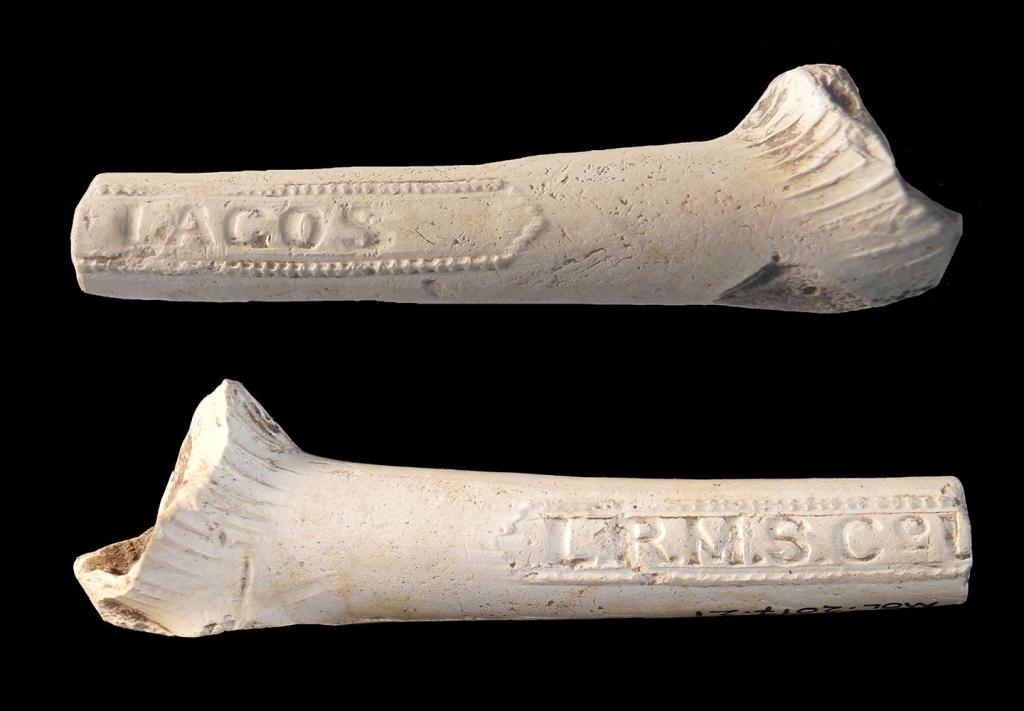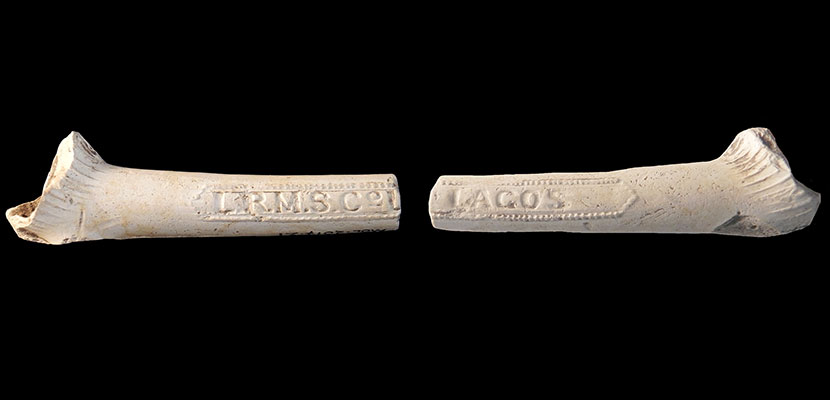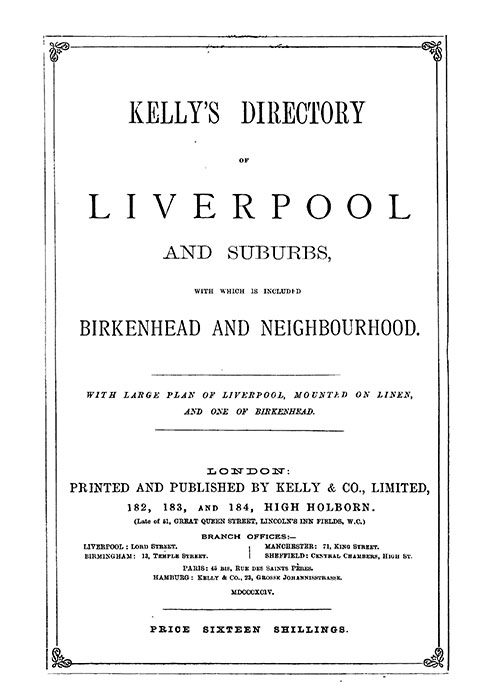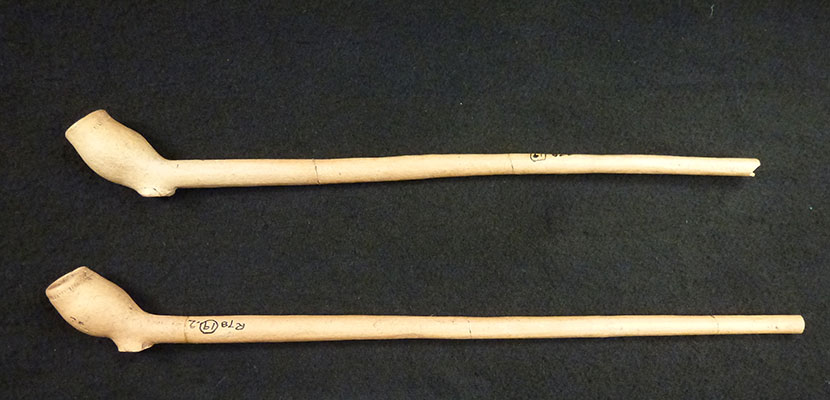From Liverpool to Lagos
Sometimes a few letters on an object can reveal a whole story, and fascinating links around the world. We have been looking into our archives to find out more about this incomplete clay pipe, MOL.2019.21, from the Regional Archaeology Collection.

Clay pipes are often discovered during archaeological excavation, through field walking and gardening throughout Merseyside. They survive well in archaeological layers and are often relatively easy to date, providing us with a handy way to date the rest of the archaeology in that same layer or context.
The incomplete clay pipe was found at Kings Dock, Liverpool and is stamped with the letters L.R.M.S Co. L on one side and LAGOS on the other side. From the style of the pipe we can tell it dates it from the late 19th century or early 20th century.

The L.R.M.S mark has been identified by the National Clay Pipe Archive as belonging to the Lagos Ready-Money Store Co. Ltd. The Lagos Ready-Money Store was founded in 1889 as the Lagos and Liverpool Ready Money Warehouse Company Ltd subsequently known as Lagos Stores.
Lagos Stores was originally formed to take over businesses in Lagos belonging to Mr J J Thomas and Mr Isaac B Williams, British merchants trading with West Africa. Thomas and Williams were importers of Manchester cottons, they owned plantations, and had a licence to cut timber. The name changes of the company shown in the table below allow us to closely date the pipe from 1889 to 1893.
Kelly's Directory of Liverpool and Suburbs, with which is included Birkenhead and neighbourhood. [1894. Part 2: Birkenhead and Trade & Court Directories] http://unilever-archives.com/Record.aspx?src=CalmView.Catalog&id=GB1752.UAC%2f2%2f33%2fCB&pos=1 http://www.pipearchive.co.uk/
|
Date |
Company name and changes |
|
16th October 1889 |
Lagos and Liverpool Ready Money Warehouse Company Ltd |
|
14th December 1889 |
Lagos Ready Money Store Ltd |
|
1st February 1893 |
Lagos Stores and Tomlinson Ltd |
|
20th April 1898 |
Lagos Stores Ltd |
|
27 November 1919 |
Acquired by the African & Eastern Company Ltd |
|
12 April 1948 |
In voluntary liquidation |
The main premises were located at Lagos Marina, with branches at Abeokuta, Ibadan, Oshogbo, Oyo, Ilorin, Minna, Zaria, Kano and Jos. Branches were established in northern Nigeria at Sokoto, Zaria and Warri. Examples of pipes marked LAGOS STORES / LIVERPOOL have been found in Ghana and Nigeria.

The company's Head Office was on Stanley Street, Liverpool, in what was to later become West Africa House, Liverpool. Entries for the company appear in the Liverpool directories from 1891-1922 inclusive and in the 1927 edition of Kelly’s Directory of Liverpool and suburbs. This company was one of hundreds which operated in Liverpool because of the city’s connections around the British Empire.

Why was it found in Liverpool?
The pipe was discovered during archaeological investigations in 2005 at the site formerly occupied by the King’s Dock. Kings dock was in use from the 1780s to 1972 and was infilled in 1983. Tobacco was one of the main products in the triangular transatlantic slave trade and a warehouse for the storage of tobacco was built at Kings Dock by the Liverpool Corporation in 1795.
Also found during the excavation at King’s Dock was a collection of around 1374 sherds of earthenware pottery, dated from 1800 to 1820. The pottery fragments were painted in high-temperature underglaze colours. High-temperature underglaze-painted pieces (referred to simply as 'painted' in potters' invoices) are rarely found in domestic situations on British archaeological sites, but are common on American ones. This type of pottery was therefore mainly made for export.
Is it possible this pipe was ready for export too? Pipes marked ‘Lagos Stores Ltd/Liverpool’ have been found amongst kiln waste in Glasgow where they appear to have been commissioned from McDougall’s of Glasgow. This pipe may have been made in Glasgow and was being trans-shipped through Kings Dock in Liverpool however it could also have been locally produced for the same company. Archaeology tells us the story of human activity in the past. This small broken object and its few letters can tell a big story with a lasting impact, a story that is important to remember.
Merseyside has a long tradition of clay pipe making. In 2013 excavations in Rainford, St.Helens uncovered more about its clay pipe industry uncovering over 8,000 fragments of clay pipes. While Liverpool is also home to the National Clay Pipe Archive (NPA) based in the University of Liverpool.

References:
Kelly's Directory of Liverpool and Suburbs, with which is included Birkenhead and neighbourhood. [1894. Part 2: Birkenhead and Trade & Court Directories]
